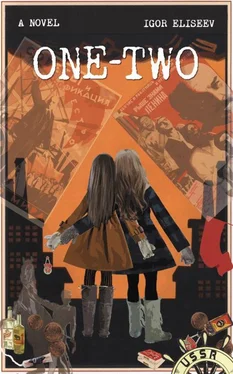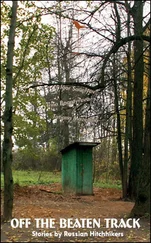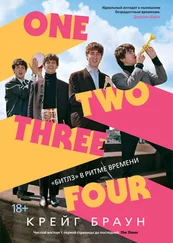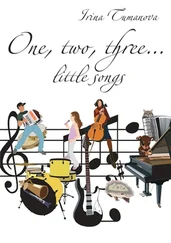“There’s no spot for us,” you murmured in disbelief.
“Don’t play stupid,” he barked and handed us a can that had emerged from his hands and seemingly out of nowhere.
“Nobody will give alms to us; besides, we don’t know how to beg,” I said.
But instead of answering, the supervisor burst into loud laughter, which made the giant pug substituting for his face shake jerkily on his shoulders.
“If everybody knew how to beg, half of this country would stand in the tunnel. Don’t look them in the face until they give alms; and when they throw a coin, raise your head, and shed a tear; they love it. I will come for money in the evening.”
He took our blanket away so everyone could see. Some people feel ashamed – those immediately turn away and reflect on the injustice of the world; others, on the contrary, look at us with aversion, spit near our feet with defiance and go their way, but there are also those who feel pity easily and quantify it in monetary terms. That’s our target public.
And, indeed, there were a lot of sympathetic people, and coins rained into our can. Well, it couldn’t have been any other way. After all, they are normal , and we are not; and they had to pay for the difference!
After getting used to it a little, we found three other cripples standing along the wall at a distance. They were really unlucky: true cripples who, by a twist of fate, managed to turn their grief into a profession playing a social role on people’s consciences. But however long I watched them, I couldn’t find that intangible borderline where their lameness ended and their real acting began. Over time, their faces were no different from the unsightly masks they wore.
Many of them could easily have run away, but they didn’t; on the contrary, they stood in the dirty tunnel every day as if in the line of duty, begging from people they despised and enriching others they hated. From the very beginning, their fate was obvious: to perish and thereby create space for others to take their place, those more lame. And still they didn’t hurry to die, demonstrating incredible miracles of longevity, clinging to life by all means possible; and the more worthless it was, the more unwilling they were to leave it.
At first I was constantly pursued by a quiet, pitiful pleading of my inner voice that kept telling me: “Quit it, Faith. Get up off your knees. This is not what you came to this city for. Where is that inquisitive girl spending her days with piles of books? Where is the girl dreaming of beautiful feelings day and night? Have you lost the last bit of your dignity?” Yes, I lost everything. I have nothing left but this animal instinct to survive. I lost my pride; my soul is trampled and crippled. This is the bottom. I am not a human being any more. The people passing by are merely obliged to point their fingers at us and to scoff at us, not hiding their disgust. With my head hung down and my arm stretched out, I was almost looking forward to new humiliation and pain, but soon, to my great surprise, I found out that this entire crowd actually didn’t care about us at all. That brought me relief and a certain freedom. Earlier, I happened to watch a small river flowing in the wood where we were roaming in search of a shelter from rain and people, or a natural turnover of inmates in the foster home; now, I see a gloomy, impenetrable flow of half-poor people rich in fake compassion; everybody is in a senseless hurry, drearily moving in space.
* * *
Several months passed; we got used to standing in the tunnel and felt at home. And everything would have been good but for a rampant and unrestrained boredom. Having nothing better to do, we counted and recounted our “old acquaintances” – white spots of faces floating by, whom we met on a daily basis. We recognized some of them by their walk, others by the clothes they wore, and others appeared so regularly that they could serve to synchronize watches. Every face was different, but they all were unified by a strange similarity, that is, by an indifference to the world around them. And if somebody put two dolls in our place, threw two quilted jackets over them and made them stretch their hands forward, nobody would notice the difference. That’s how it goes. It’s easier to close your eyes than to ruin your life with risky and unattractive truth. We catch indifference like the flu from each other: symptoms are different, but the consequences are always the same and catastrophic.
Most often, however, we met passersby for the first time; they gave us a glance not expressing any sort of surprise; their eyes were disinterested and bored; not a single urge enlightened their “blind” faces. It is hard to believe, but owing to such “day-flies” I quickly got used to being in the public eye and started seeking people’s company from an urge of my own. Thus, having become conspicuous, from an ugly burlesque of humans, we turned into ordinary twins. There’s a certain magic in it, don’t you agree? It turns out that conjoined people aren’t so unnatural. They are just a strange whim, a kink in nature, deviation that doesn’t seem to exist but is encountered every day.
All day long we were acting out ecumenical grief and humility, but I didn’t really feel anything of that kind, though I tried my best. In order to correspond to the “beggar’s iconic image”, I always raised my head submissively when people were throwing us money, and thanked them. Donors truly believed that by giving alms they were doing something very significant and well-timed, which fed their egos. Like a wooden idol in a temple, we had nothing but to play mute, accepting other people’s donations and “absolving sins”. However, I don’t claim to be an angel speaking the undeniable truth; these are just the ordinary thoughts of unordinary people among ordinary people.
When we got bored with counting familiar and unfamiliar faces, we went further and created various roles for ourselves: you pretended to be a stutterer and I shook my head like a madman. Once we had immersed ourselves completely in these roles, we roared with laughter; I guess we were heard throughout the tunnel. It’s an odd thing, but that attracted far more people to us than usual, and the amount of coin in the beggar’s can doubled.
So, gradually, the real world existing outside the tunnel and the world in which we lived became less and less disturbing, reaching us only by “people flashing” and by small memory ripples. We were very well aware that just several hundred yards away, literally on the neighboring railway platform, real life was in full swing every moment of every day, and that somebody met someone else or saw someone off; couples embraced each other, kissed and swore eternal love but at the same time, they were as far away from us as though they inhabited a different solar system. Meanwhile, our lower world was full of eternal melancholy: stubborn people glimpsed like shadows, hurrying about their important but useless errands, exchanging their lives for trifles and mistakes.
Nevertheless, the two worlds sometimes came closer to each other. I remember we once stood on our usual spot when a family passed by: two twin girls of about fourteen with their parents. They weren’t even going but floating in such a manner that one could be forgiven for believing they had come for a walk in the tunnel. Taking their time and totally captivated by each other, they didn’t seem to notice their surroundings and their brutal reality. Their parents were holding hands, whispering gently to each other like a couple of lovers; their faces radiated happiness, lighting up everything around. First the twins didn’t notice us but then we met. What a surprise it was to see pure, sincere compassion in their eyes. It seemed like our looks pulled the girls out of their habitual lives and showed them that reality, after all, can be this way . It lasted just a moment, whatever it was: one saw grief, and the other hope. It is impossible to believe that one single event can give rise to such different emotions.
Читать дальше












